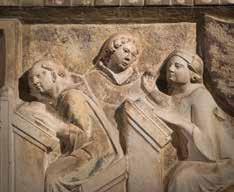
11 minute read
EDUCATING CIVIL LAW AND COMMON LAW NOTARIES
Bologna and Beyond
MEDIEVAL AND MODERN NOTARY EDUCATION
Peter Zablud, AM, RFD
In September 2011, The Australian and New Zealand College of Notaries conducted its first off-shore International Conference, in Bologna, Italy—the birthplace of the modern notariat. Delegates from civil law and common law jurisdictions attended the Conference, including a splendid contingent from British Columbia, led by the redoubtable Wayne Braid.
The opening session was held in the Salla dello Stabat Mater in the iconic Archiginnasio, built in the 16th century to be the (then) new main building of Europe’s oldest university and law school, thought to be constructed on the very site where the legendary author and teacher Rolandino de Passaggeri first taught prospective Notaries 3 centuries before. in about 1116. Over the years, Bologna’s University was host to many thousands of students from all over Europe. Scholar’s Privileges In line with Roman practice as expounded in the Corpus Juris Civilis (Body of Civil Law) prepared by the Emperor Justinian in the 5th century, in medieval Europe special favours or prerogatives (generally known as “privileges”) were granted by both Church and State as rewards to scholars whose work and professional advice benefitted public welfare and the community.1
Privileges included exemptions from local taxes, civic duties, and military service as well as guaranteed safe passage for students travelling to and from places of study.2
The portico of the Archiginnasio Library of Bologna
Beginnings The collapse of the Western Roman Empire at the end of the 4th century is said to have ushered in some 600 years of the so-called “Dark Ages.” The 12th century Renaissance (not be confused with the 15th century Florentine Renaissance) saw a revival of commercial and urban life in Mediterranean Europe that, in turn, created a need for professionals such as Notaries who were the lawyers and legal advisors of their day but who did not appear in Courts as advocates.
By the mid-12th century, the first universities appeared in response to the demand for institutions that would provide education for professionals. The outstanding centre for the teaching of law was established in Bologna
RossHelen / Shutterstock.com
1 See e.g Pearl Kibre, Scholarly Privileges:
Their Roman Origins and Medieval
Expression, The American Historical Review (1954) 543
The Emperor Frederick Barbarossa At his coronation as Emperor in Rome on 18 June 1155 by Pope Adrian IV, the German King Frederick Barbarossa (regnal years 1155–1190) took on the title Imperator Frederick Barbarossa Augustus assumed by Charlemagne for himself and his successors when he was crowned by Pope Leo III on Christmas Day, 800. The Emperor’s title and role carried with them the traditional power to grant privileges, including scholars’ privileges, throughout Europe. The Authentica Habita On receiving advice from three of Bologna’s professorial luminaries in support of his imperial claim to rule Italy, in 1155 the new Emperor rewarded the University by the grant of the Constituo (Decree) Authentica Habita. 3
Among other things, the Habita granted imperial protection and safe passage to all students and teachers travelling to and from the University, exemptions from confiscation of their goods by way of the legal process of “reprisal,” as well as the (important) right to defend themselves against civil claims before judges of their own choosing, rather than before judges chosen by plaintiffs.4
In giving the masters and students special legal and financial status, the Habita brought kudos and status to the University itself.
3 Loosely translated as “The Authorised manner of the continuing existence [of this
Community of Learning]”
4 Julius Kirshner, Made Exiles for the Love of
Knowledge; Students in Late Medieval Italy,
Medieval Studies 70 (2008) 162 at 164 Rolandino and the Artis Notariae Since its inception, Bologna’s University always has had more than its fair share of eminent teachers and students. Dante and Erasmus both studied there. Gratian, Petrarch, and Copernicus were professors at the University. Of the many notables who taught law in medieval times, among the most famous was the Notary Rolandino de Passaggeri (1215–1300); best known for his seminal work, Summa Totius Artis Notariae (the Totality of the Notarial Art), published in 1256, which became the standard handbook for European Notaries for some hundreds of years. Educating Civil Law Notaries Within the civil law environment, Notaries sit at the centre of their respective legal systems. Notarial practice is an important and highly specialized activity that is primarily domestically oriented.
In most civil law jurisdictions, entry level education for Notaries is exacting and intellectually demanding. As a rule, prospective Notaries must hold law degrees and must have graduated in the top percentiles of their classes. They must then complete 2- or 3-year postgraduate qualifications in Notarial practice followed by up to 6 years as a trainee or an associate Notary in an established Notarial office.
It should be noted that despite the generally high educational standards required for civil law Notaries, there are several civil law notariats where the training of Notaries, particularly in relation to interventions for international purposes, can best be described as suboptimal. Educating Common Law Notaries Other than the USA, which is in a special category, there are some 70 large and small common law jurisdictions. Unlike BC Notaries, most common law Notaries have little or no domestic function akin to that of their civil law cousins. Typically, their services are provided in support of international commercial and personal transactions.
Sadly, the fact is that over the years, the level of education required of prospective and practising Notaries in most common law jurisdictions has been unsatisfactory.
The First Course for Notaries Bologna was the first university to provide a systematic vocational course of training for Notaries. By the time of Rolandino’s death in 1300, Notaries wishing to practise in Bologna and its environs were required by the powerful local Guild of Notaries to have completed a 6-year course of instruction at the University and then to have passed an examination in grammar, Latin, and the notarial art.5
5 C.R. Cheney, Notaries Public in England in the thirteenth and Fourteenth Centuries (Oxford University Press, 1972) 77

©iStockphoto.com/brandtbolding
A medieval bas relief of law students in Bologna

With few exceptions, education is not and has never been high on the list of priorities of the authorities who appoint common law Notaries.
Until relatively recently, the received wisdom in Australia and New Zealand was that if a prospective Notary were a senior practising lawyer, he or she would immediately be able to conduct a competent Notarial practice once appointed as a Notary. Save in relation to English Scrivener Notaries who are and always have been in a highly qualified class of their own, the same view was held in England and elsewhere in the former British Dominions and Colonies.
The unstated theory seems to have been that immediately upon appointment, particularly by the Court of Faculties of the Archbishop of Canterbury, there would be a blinding flash of light and the new Notary would suddenly know everything. It may be that in England being physically closer to the Archbishop (and therefore closer to God), the position was different. But in the antipodes and elsewhere in common law jurisdictions, when appointed, typically new Notaries knew nothing and were out on their own.
In truth, Notarial practice in most common law jurisdictions is not overly difficult for experienced lawyers. Even so, it can be demanding and is often complex, requiring a level of specialist knowledge and a degree of skill not usually anticipated by most who seek appointment to the notariat.
Notarial intervention for international purposes can be quite tricky, particularly when dealing with the confusing and messy problems in the area so delightfully described by the late Professor Donald Schön as the “swampy lowlands of practice.”6
6 Donald A Schön, The Reflective Practitioner – How Professionals Think in Action, (Basic
Books, 1983) 42
Following the rapid expansion of international trade and investment that began in the 1980s, the requirement for and the role of Notaries in all common law jurisdictions has burgeoned massively—covering areas not even on the horizon 60 or 70 years ago.
In turn, that was accompanied by an increased understanding by many Governments and Societies of Notaries for the need for specialist entry level education for prospective Notaries.
In British Columbia at the time of its 1911 legislation, no specialist qualifications for appointment were required by the Act. Compare that to the high standard of education now required in BC, where to be appointed, Notaries must undergo serious education and training including obtaining a Master’s degree qualification from Simon Fraser University.
In the 1980s, in England and Wales it became mandatory for prospective Notaries (who were then and still are drawn from the ranks of practising lawyers) to complete a Diploma in Notarial Practice, originally offered by the University of Cambridge, but now offered by University College London. Notaries in Hong Kong and Ireland (who must be senior practising lawyers) must undertake high level Notarial education to qualify for appointment.
The State of New South Wales led the way in Australia in 1995 by requiring completion of a short course, conducted by the College of Law in association with the NSW Society of Notaries as a precondition to appointment as a Notary in that State. The passage of the State of Victoria’s Public Notaries Act 2001 with its mandatory education requirement resulted in prospective Victorian Notaries having to complete a Graduate Diploma in Notarial Practice (now “The Professional Course in Notarial Practice”) offered by the Sir Zelman Cowen Centre at Victoria University, Melbourne. That course is presently the leading course of its kind in the common law world.
Instituting serious courses of education is a slow process. The State of South Australia is about to conduct its first compulsory entry level course for prospective Notaries. Unfortunately, several other Australian jurisdictions and New Zealand stoically refuse to require neophytes to be formally educated in the Notarial art— thereby doing themselves and their clients a major disservice.
New Zealanders et al are not alone. Most common law jurisdictions, including Canada’s common law Provinces and Territories, other than British Columbia, have not seen fit to specifically educate their Notaries. That failure has resulted in embarrassingly substandard Notarial interventions, especially for international purposes. Little wonder that civil law Notaries look down their noses at common law Notaries and almost universally believe that all common law Notaries are of the same ilk as their untrained, unqualified American namesakes.
Incredibly, most common law notariats have not established Societies of Notaries or other professional organizations to represent their interests, including those concerning education and training. Where they do exist, Societies of Notaries have a key role in relation to education.
It is they who must promote the need for specialist education and assist academia in the design and presentation of courses. It is they
When Kamiah’s world gets turned upside down, help her stay strong. A Will can help do that.
What if you could help your clients create a legacy where fewer children suffer from illnesses? When you help your clients leave a gift in their Will to BC Children’s Hospital Foundation, you’re empowering them to do just that.

Discover how you can help your clients leave a legacy. bcchf.ca/legacy-advisor
Hilary Beard, Gift & Estate Planning 604.875.3679 hbeard@bcchf.ca
Every day. Every matter. We’re here for you.
Powerful and flexible conveyancing, designed by and for BC legal professionals
www.doprocess.com/prosuite who must constantly liaise with universities and local institutions that formally provide training; it is from the ranks of the Societies that teachers must be drawn.
Most established Societies are willing and able to assist newer Societies in their educational efforts. For example, the London Scriveners have long been active in training Hong Kong Notaries.
The involvement of Societies of Notaries in education and training should not stop at entry level. Societies, and in the case of British Columbia, the Association, also have a major role in connection with ongoing professional development. In today’s fast-moving world, the knowledge and training required by Notaries to provide a proper level of service must be constantly maintained and kept up-to-date.
It is essential that programs be planned and not just presented ad hoc. A well-thought-out professional development program may usefully be conducted over a 3-or-4 year cycle. Obviously, a program can be varied or supplemented as and when specific issues arise.
Thought and effort put into planning, presenting, and evaluating professional development programs will unquestionably see worthwhile programs emerging that will be of genuine value to practising Notaries and therefore to the public they serve. In Conclusion Two pertinent quotes about education 1. “Education is the passport to the future, for tomorrow belongs to those who prepare for it today.” - Malcolm X 2. “Education costs money but so does ignorance.” - Baron Claus Moser s Professor Peter Zablud, AM, RFD, is an Australian Lawyer and Notary and the Director of Notarial Studies, Victoria University, Melbourne, Australia.








